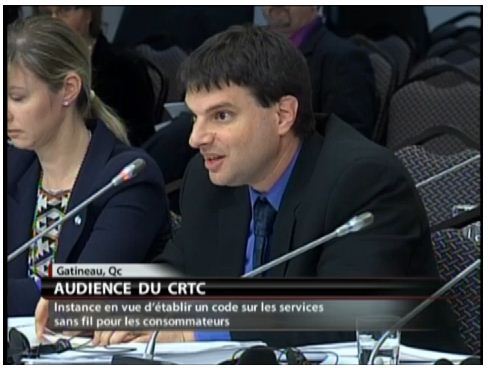
GATINEAU – “The initial reaction to say remove the three-year contract as an option outright, is actually anti-consumer. Yes, I say that, it’s anti-consumer,” said Jonathan Daniels, vice-president of regulatory law at Bell Canada on day four of the CRTC’s wireless code of conduct hearing.
Bell took its turn on the hot seat on Thursday morning after delivering its opening remarks on Wednesday afternoon to defend its comments on the draft code. The company argued that three-year contracts benefit consumers, and in fact, the length of the fixed term isn’t the underlying problem consumers find with the system.
Daniels explained that the provinces which have adopted consumer protection legislation realized it wasn’t the length of the contracts, but the terms for exiting them, that was the biggest frustration for consumers. As exists in the Quebec legislation, the early termination fee (ETF) mechanism provides consumers with the solution to their three-year contract problem: Pay the remaining balance on the handset subsidy. Combine that with the personalized information summary and the solution is there, he added.
“You put those two together, I think frankly, you’re solving the real problem without doing the harm that we’re saying could potentially happen,” Daniels (pictured on the CPAC.ca feed) argued. “I think we have the solution and it’s also I think why some of the consumer groups before us here came in with the position that you should ban three-year contracts. Now I think hopefully listening to this they can reconsider that and soften that a little bit.”
Commissioner Steve Simpson pressed Bell on the matter wondering if consumers could finance device purchases separately from the service would wireless operators see greater demand for one-year contracts.
No, was the response from Wade Oosterman, president of Bell Mobility, because consumers just don’t want to do this. “We do try to listen to consumers, and what consumers are telling us is they prefer to pay less and commit to three years,” he said.

There have been calls from consumer groups and others during the hearing to separate the device from the service, where the handset itself could be purchased separately from the service. The Consumers Council of Canada (CCC) is one such group pushing this type of arrangement.
Under questioning from CRTC chair Jean-Pierre Blais, CCC acknowledged that it wasn’t looking for consumers to have to make two separate transactions when subscribing to wireless services, but that there are two distinct yet interrelated transactions taking place. The council appeared before the Commission on Wednesday.
“If they can buy the device and finance it with other options and they can make a fair comparison, then why would you ban the business?” said Ken Whitehurst, executive director for the council.
Bell representatives suggested to the CRTC that if it were to allow this, subsidized phones would no longer exist in the Canadian market. Besides, the subsidy is not a loan, it’s an economic inducement in return for a fixed term contract, they added. “There are no financing – in the legal sense of financing – provisions or allowances made for consumers. It’s an economic inducement for the client to commit to stay with us for a certain period of time and separating those two would be difficult to say the least,” explained Oosterman.
Daniels added the company would have a big problem if the Commission were to allow consumers to the finance the purchase of a device with Bell, but then have the customer get service from a competing carrier. “If we actually came up with a rule that allowed people to basically separate the service from the subsidy, there wouldn’t be any subsidy, at least not from us. That’s a bank’s role. We’re not in that business,” argued Daniels. “I don’t think any of the other service providers would do it and therefore you’d end up with situation where companies would stop subsidizing phones to the detriment of people having the latest and greatest handsets in their hands, not just on the Bell Mobility network but on all networks across Canada.”
Public Mobile took the stand on Thursday to argue that while it supports a national wireless code of conduct, it shouldn’t apply to the prepaid services it offers. The company is worried it may be subject to additional costs if the code were to apply to its services.
“To be frank, our greatest concern is that the Commission creates a federal code of conduct and then applies it to prepaid services to address the sins of other carriers,” said Bruce Kirby, CFO and senior VP of strategy and business development at Public Mobile. “Our low-cost operating structure could – unintentionally or not – be impacted in a way that precludes or structurally changes our ability to continue to offer affordable services to the very cost-conscious Canadian consumers who cannot afford services offered by the incumbent carriers.”
The hearing wraps up Friday with MTS Allstream, Globalive and Quebecor all due to face the Commission. Check out our first three days of coverage here, here and here.



